Iranian-Danish Artist Shreds Quran Outside Iran’s Embassy
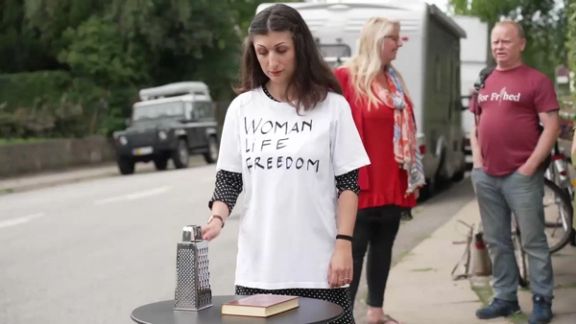
An Iranian born artist shredded a copy of Islam’s holy book, the Quran outside the Iranian embassy in the Danish capital Copenhagen on Saturday.

An Iranian born artist shredded a copy of Islam’s holy book, the Quran outside the Iranian embassy in the Danish capital Copenhagen on Saturday.
Firoozeh Bazrafkan, who has staged similar symbolic performances several times in the past, said the deliberate shredding of the Quran was a commentary on the Iranian regime’s hypocritical demand for respect for the holy book while it fails to show any respect for women’s rights.
She dedicated her performance to Iran’s women and men who continue to defy the oppressive regime, and extended her tribute to citizens and politicians worldwide who support the Iranian people’s quest for a dignified life.
Bazrafkan has staged several performances against the Islamic Republic and its religious ideology. The artist and blogger is known for including nudity, shredded Qurans, blasphemy and Nazi hymns in her works.
In an installation art piece dubbed "Blasphemy?” showcased in a gallery in 2014, she ran a copy of the Quran through a shredder and placed it on a prayer mat. Later in that year, she released a video, in which she stripped naked and put her clothes over the Quran, while another artist, Kasper Norby Lund, recited texts from the book.
In recent weeks, copies of the Quran have been burnt on several occasions in Sweden and Denmark. The Iranian government has strongly condemned the desecrations and officials have threatened the perpetrators with severe punishment.
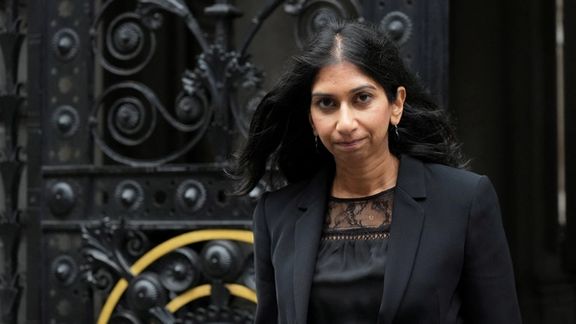
Britain's home secretary Suella Braverman says Iran's Revolutionary Guard poses the a serious risk to UK’s national security amid fresh evidence of its reach.
As pressure is growing on the British government to proscribe the IRGC, Home Secretary Braverman fears that the outfit is stepping up its activities, attempting to recruit members of organized crime gangs to target opponents of the regime.
The Sunday Times quoted a source close to the home secretary as saying that “The Iranian threat is the one that worries us the most.”
“It’s a big issue because they are getting much more aggressive, and their appetite is increasing. They are very defensive to anyone challenging their regime and just want to stamp it out,” the source said, underlining that “They are increasing their agitation.”
In February, Security Minister Tom Tugendhat told Parliament that the Iranian regime was behind 15 credible threats to kill or kidnap British citizens or people based in the UK in just over a year.
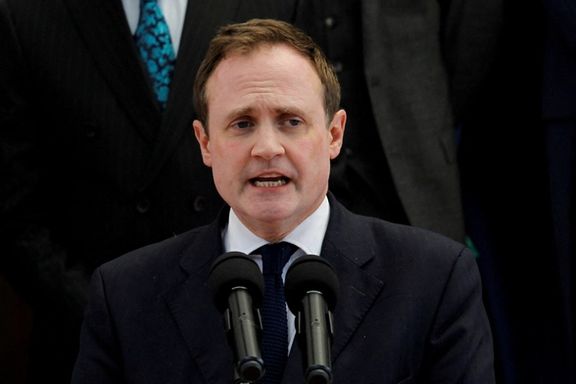
However, last month, the government again rejected calls to proscribe the IRGC as a terrorist group in favor of expanding the criteria by which its supporters and affiliated companies can be put under sanctions. The UK Foreign Office seems worried that designating the IRGC as a terrorist group could permanently harm diplomatic relations.
The new sanctions regime would allow ministers for the first time to sanction Iranian officials and individuals for their activities both Iran and in the UK, where they seem to have increased their sway.
The Home Secretary’s warning came just after Iran's IRGC commanders were revealed to be spreading extremist antisemitic propaganda in UK universities via a London student organization. The Sunday Times disclosed earlier in the week details of the close relationship between the Islamic Republic and the Islamic Students Association located in a former Methodist church in west London.
The association was set up to promote the religious and political philosophy of Ruhollah Khomeini, the founder and first Supreme Leader of the regime who ruled until his death in 1989.
The center hosts discussions with Iranian government officials and hardline clerics at Kanoon Towhid, an old church in Hammersmith that carries a portrait of Khomeini at its altar, as well as the Islamic Republic's flag.
According to an investigation by the Jewish Chronicle, since early 2020, at least eight IRGC leaders addressed British student audiences, trying to radicalize them. The speakers, some of whom are sanctioned by Britain for human rights abuses, have been involved in suppressing dissent within Iran.
Recordings obtained by media outlets exposed statements from commanders like Saeed Ghasemi, who claimed the Holocaust was "fake" and advocated for violence against Jews in “an apocalyptic war.”
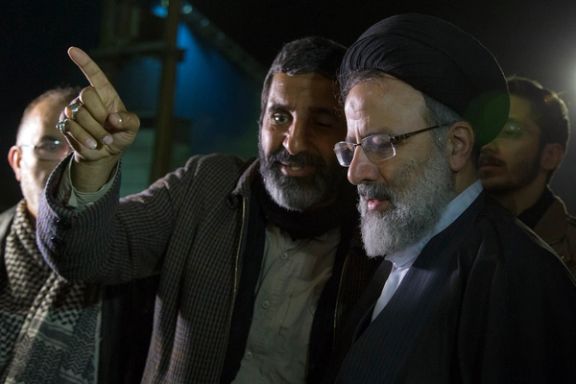
Another IRGC man who delivered lectures at the center was Hossein Yekta – a commander of IRGC’s plainclothes agent during crackdown on protesters – who claimed Jews "created homosexuality" and urged his audience to "raise the flag of the Islamic revolution, Islam, and martyrdom."
The association's internal elections are also observed by representatives of the Supreme Leader Ali Khamenei. In January this year, Mohammad Hossein Ataee Dolatabadi, a former chairman of the association and a master's degree student at the University of Bradford, made a trip to Tehran, where he met Khamenei. He later received a 'blessed' keffiyeh, which is a traditional Arabic headdress, as a gift, a token of his allegiance to Iran’s ruler.
Dolatabadi says he is no longer the chair of the organization since October 2022. Nonetheless, he remains the chair of its parent organization, the Union of Islamic Students Associations in Europe, according to Khamenei's official website.
The association's Telegram channel had reportedly made posts praising Qasem Soleimani, the former IRGC Quds Force commander who was killed in a US air strike in January 2020.
Alicia Kearns, the chair of the Foreign Affairs committee, condemned the organization's activities, stating, "To broadcast the jihadist and deeply antisemitic ideas of senior members of the IRGC to students across Britain is a brazen act of radicalization. We must pursue and prosecute those responsible for trying to incite violence here in the UK."
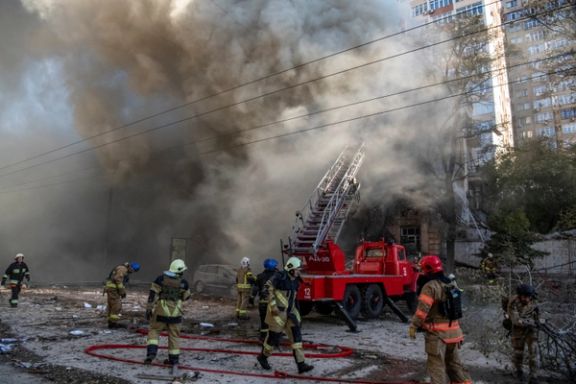
Russia used 27 Iranian-made drones and 30 missiles to attack large swaths of Ukraine early on August 6, as a conference took place in Saudi Arabia exploring options for peace.
The Russian attack came in two waves. First, missiles were fired at various targets late on August five, and the second wave followed on August 6, when the Iranian drones were used.
Ukrainian officials said all 27 Shahed 136 and 131 drones were shot down by air defenses but some of the missiles fired from the Black Sea and the Caspian region got through.
Russia regularly uses the Iranian drones during massive missile attacks to overwhelm Ukraine’s air defenses, although Kyiv’s military has learned how to shoot down most of the relatively slow-moving Unmanned Aerial Vehicles (UAVs).
Iran has supplied hundreds of the killer drones to Russia since mid-2022, but insists it is neutral in the war and is not arming Russia.
US Defense Intelligence Agency (DIA) has decided to show foreign officials “undeniable” evidence of the Iranian origin of the drones shout down over Ukraine NBC News reported on Friday.
Washington first warned about Tehran’s plan to supply attack drones to Russia in July 2022 and in October it announced that indeed Moscow had started to use Shahed kamikaze drones against Ukraine. In February the DIA issued a report saying that analysis confirmed Russia’s use of various lethal Iranian unmanned aerial vehicles (UAVs) against Ukraine.
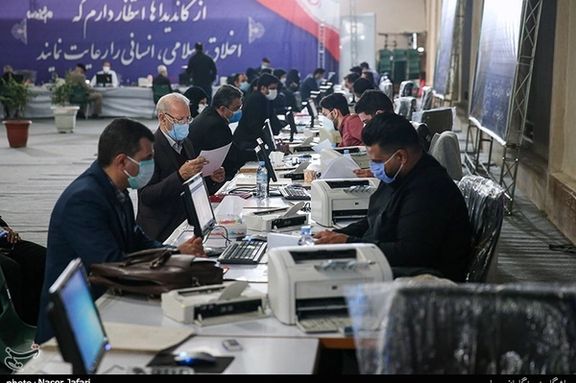
Iran has started candidate pre-registration for the parliamentary elections scheduled for March 1, 2024, urging those interested to start the process of vetting.
Thousands of people usually apply to be approved as candidates in Iran’s legislative elections, but most are disqualified by the constitutional watchdog, the Guardian Council, and the interior ministry.
Any aspirant for candidacy must first be a loyal supporter of the clerical regime. No critics or dissidents have ever received approval to run in elections. However, the highly controversial vetting reached a new level of discrimination in the 2020 parliamentary elections, when most moderate regime insiders were also banned. The result was a parliament dominated by ultraconservative hardliners.
Candidate registration usually takes place one month before the vote, but this year the government has decided to launch early registration that will last one week. The scheme seems to be designed to create an aura of a more democratic electoral environment, but in practical terms it changes nothing in the vetting process. It will also allow more time for the government to check the background of those who pre-register.
Interior Minister Ahmad Vahidi Sunday urged prospective candidates to register now but resign in the final official registration.
In Tehran, analysts, as well as many regime politicians, have been warning that, following the 2020 experience, only hardliners are likely to register for March 2024. This will hurt the credibility and the legitimacy of the next parliament, amid an already tense political environment after months of popular protests.
Many have urged the government to organize a more inclusive vote, allowing reformists and moderates to compete next year.

The Islamic Republic of Iran is about to create its fourth full-fledged intelligence agency mainly to respond to growing domestic opposition and likely protests.
In fact, it is perhaps not accurate to say that the regime is creating a new agency, rather it is elevating the existing “protection and intelligence” department of its notorious Judiciary to an intelligence “Organization.”
The same process took place 13 years ago when the intelligence department of the Revolutionary Guard was elevated to the status of an ‘organization’ in the aftermath of mass protests in 2009. Since then, the IRGC’s intelligence arm has become the leading instrument for domestic repression.
Media in Tehran say that starting Sunday the Islamic Republic’s parliament will discuss a bill presented more than a year ago to officially elevate Judiciary’s intelligence organization. That would mean more power and budget for another instrument of repression amid the regime’s fear of renewed unrest as the first anniversary of last year’s Mahsa protests approaches.
Last December, a lawmaker commenting on the initiative said that gathering information and reports about sensitive cases “to counter the propaganda campaigns by the global arrogance” is part of the duties of the new organization, indicating that the body will also coordinate with other entities outside the judiciary’s apparatus. “Global arrogance” is a term used by the Islamic Republic to refer to the United States.
The clerical regime is known for its habit of creating parallel bureaucracies, having dozens of organizations for Islamic propaganda, or actually keeping two distinct militaries, the IRGC and the traditional army called Artesh in Persian.
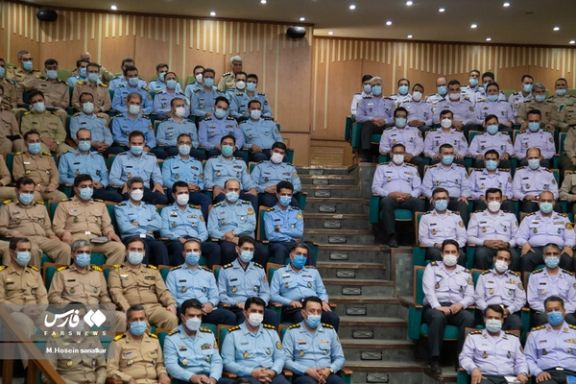
Part of this modus operandi stems from the internal politics of the regime and the need to dole out power and perks to factions and players in its inner circles. But in some areas, such as intelligence it could be an authoritarian impulse not to trust any single organization with the security of the regime’s inner core.
Four decades ago, there was only one official domestic-foreign intelligence bureaucracy – the Ministry of Intelligence – or information, as the Persian word for both is interchangeable. Then came the IRGC and the police intelligence organizations, to be augmented now with Judiciary’s parallel arm.
Unlike Western countries, such as the United States, there is no sign of distinct areas of responsibility between the four top intelligence-security organizations. They all spy on citizens, arrest dissidents with or without a warrant, have their own offices in infamous prisons such as Tehran’s Evin penitentiary. They all interrogate, and torture political prisoners and extract forced confessions. The only discernible distinction is that the Ministry of Intelligence and the IRGC intelligence have extensive foreign operations.
Speaking of foreign espionage and black ops, there is, in fact, a fifth entity, the IRGC Quds Force, that controls tens of thousands of paid militia forces throughout the Middle East. These forces are used for espionage, political influence operations, intimidation of politicians and groups in other countries, and the use of force.
The Iranian regime, which also has smaller intelligence entities has a Council for Intelligence Coordination comprised of at least 13 to 16 separate active intelligence agencies, according to different sources. Most of these parallel agencies have strong ties with the IRGC and the judiciary as well as the office of the Supreme Leader. The intelligence minister, the interior minister, foreign minister, and the country’s chief justice are members of the body. The IRGC’s Intelligence Organization, and its Intelligence Protection Organization, and their counterparts in the traditional Army and Police force as well as cyber police are some of the other members.
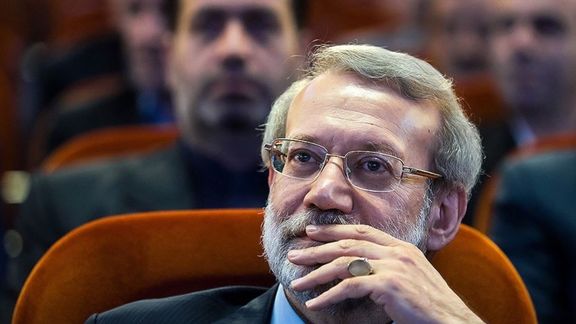
The core of Iran’s regime seems to be looking for ways to make the upcoming parliamentary elections a bit more credible, given all the limitations on who can run.
One of the political figures much discussed in the past month as a possible leading candidate for the March 2024 legislative elections is former parliament speaker Ali Larijani, a moderate conservative who was not allowed to run in the 2021 presidential race by the Guardian Council under the control of Iran’s ruler Ali Khamenei.
However, in a statement that sounded like an indirect message to Larijani, the spokesman for the Guardian Council, a body that vets election candidates said: "If someone has been disqualified for running for President, it does not mean he cannot run for parliament."
Entekhab news website quoted Guardian Council Spokesman Tahan Nazif on Wednesday as sayingthat the regulations for parliamentary (Majles) elections are different from those the presidential elections.
Larijani’s disqualification two years ago came as a shock not only for the general public but also for many regime insiders, who could not find a justification as to why a three-term parliament speaker could run for president.
The statement by the Guardian Council now gives Larijani's supporters, generally moderate conservatives and reformists, peace of mind that they can start campaigning for Larijani, hoping that others named in the same elections lists with him will also make it to the parliament.

However, Larijani has not signaled his readiness to run and he is perhaps weighing his options whether to run from Tehran where his election would guarantee the election of another 29 candidates, or from his traditional constituency in Qom.
Considering his cautious character, Larijani might prefer to run from Qom where one or two hundred thousand votes can get him through. However, moderates and reformists might have to persuade him to run from Tehran to benefit from his popularity for other likeminded candidates.
Another politician who was barred from running in two presidential elections, is former President Mahmoud Ahmadinejad. However, according to the reformist Arman Melli daily, he has been conspicuously silent about the 2024 Majles election.
The daily wrote that the reason for Ahmadinejad's silence is that he wishes to send several of his aides to the Majles and does not want to invite controversy and trouble for them before the elections. Arman Melli added that Ahmadinejad's men might enter the election as a group separate from the likeminded ultraconservative Paydari Party.
Nonetheless, according to the daily, Ahmadinejad's men might link up with Paydari when they deem it beneficial for their electability. However, Ahmadinejad himself is unlikely to run for any office other than the presidency.
Many media outlets in Tehran quoted reformist daily Etemad as having reported about rivalries in the conservative camp. Neocons led by current Majles speaker Mohammad Bagher Ghalibaf are attacking the hardliner Paydari Party in a pre-election battle. Ghalibaf's men and their media outlets teasingly call the Paydari politicians "super revolutionaries" and highlight their blunders and inefficiency.
Ghalibaf's neo-cons have threatened the Paydari to either accept a compromise with them or risk being ostracized by other conservative groups, said Etemad. The daily wrote that Ghalibaf's men are aware of Paydari's weaknesses and take advantage to exert their influence.
This comes while many in Iran, including reformist politician Mohammad Sadeq Javadi Hesar are aware that "elections are non-democratic," as he told Etemad Online, and the fate of the elections are determined at Khamenei's office, his Guardian Council, and the IRGC headquarters, as it has been the case in the past two elections.